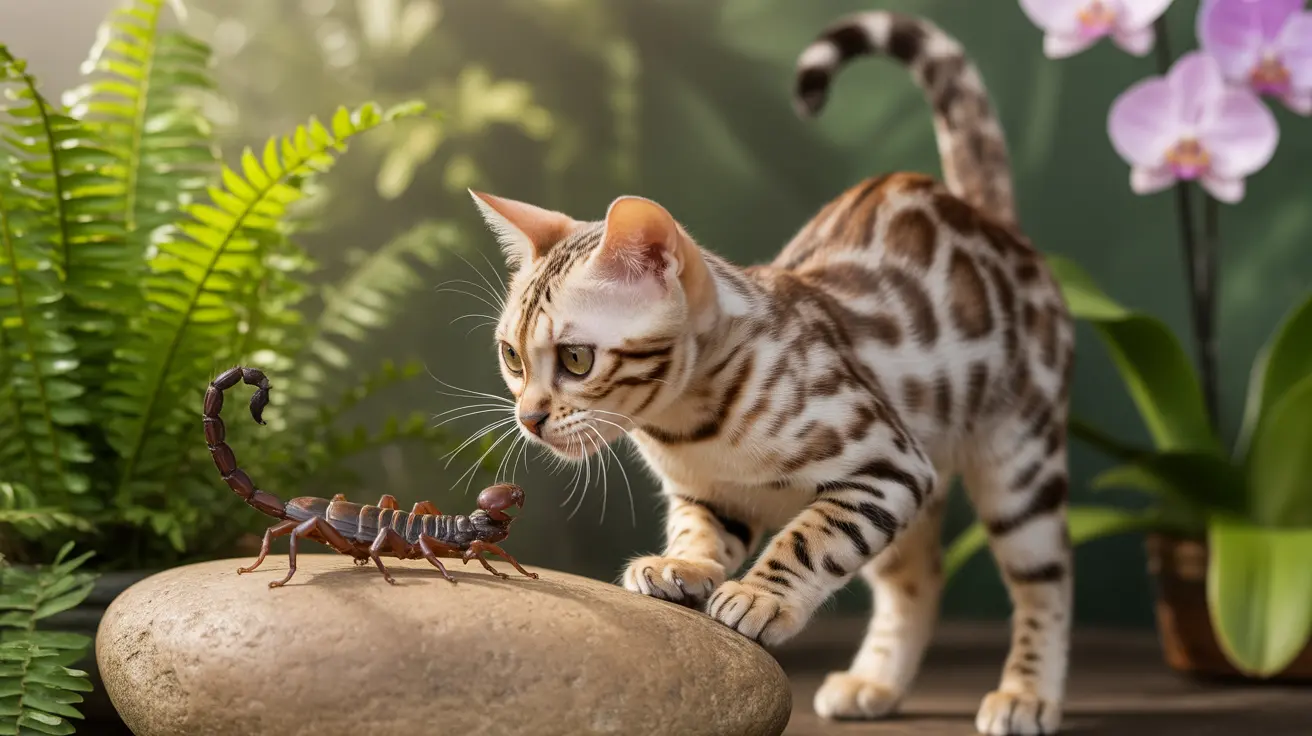Natural Hunting Behavior of Cats
Cats are instinctive predators, and their hunting behavior extends to various small creatures, including scorpions. Whether domestic or feral, cats often approach scorpions with calculated precision, typically batting at them to flip them over before delivering a decisive strike. Their exceptional reflexes and thick fur provide natural protection during these encounters.
While well-fed house cats may hunt scorpions purely for sport, feral cats might consume them as part of their survival strategy. However, this behavior doesn't mean scorpions should be considered a safe or appropriate food source for our feline companions.
Understanding the Risks
Although cats generally handle scorpion encounters better than other pets, they're not immune to scorpion venom. Of the approximately 2,000 scorpion species worldwide, several can pose serious risks to cats. The Arizona bark scorpion, in particular, is known for its potent neurotoxic venom that can be dangerous to both humans and pets.
Most cats who encounter scorpions may experience mild reactions, but severe cases can occur, especially with more venomous species. The risk level often depends on factors such as the scorpion species, the cat's size, and where the sting occurs.
Signs Your Cat Has Been Stung
Recognizing the symptoms of a scorpion sting is crucial for prompt treatment. Common signs include:
- Localized pain and swelling
- Excessive licking of a specific area
- Limping or favoring a limb
- Vomiting
- Difficulty breathing
- Changes in behavior or hiding
- Tremors or seizures (in severe cases)
Treatment and First Aid
If you suspect your cat has been stung by a scorpion, immediate action is crucial. Clean the affected area with cool water and apply a cold compress if possible. However, the most important step is seeking veterinary care, especially if you notice any concerning symptoms.
Professional medical treatment may include:
- Administration of antivenin (in severe cases)
- Pain management
- Supportive care
- Monitoring for complications
Prevention and Safety Measures
The best approach to cat-scorpion encounters is prevention. Consider these safety measures:
- Seal entry points around your home
- Keep your yard clear of debris where scorpions might hide
- Consider professional pest control services
- Monitor your cat during outdoor activities
- Keep cats indoors during peak scorpion activity hours (night)
Frequently Asked Questions
Do cats eat scorpions, and is it safe for them to do so?
While cats may hunt and occasionally eat scorpions, it's not safe or recommended. Cats can get stung during the encounter, and scorpions offer no nutritional benefits that justify the risk.
What are the common symptoms if my cat gets stung by a scorpion?
Common symptoms include localized pain, swelling, excessive licking, limping, vomiting, and in severe cases, breathing difficulties or neurological symptoms like tremors.
How should I treat my cat if it has been stung by a scorpion?
Clean the affected area with cool water, apply a cold compress, and seek immediate veterinary care. Don't attempt to treat the sting with home remedies or over-the-counter medications without veterinary guidance.
Are certain scorpion species more dangerous to cats than others?
Yes, some species are more dangerous than others. The Arizona bark scorpion is particularly dangerous, while many other species cause only mild reactions. However, all scorpion stings should be taken seriously.
How can I prevent my cat from encountering or getting stung by scorpions?
Prevent encounters by sealing entry points in your home, maintaining yard cleanliness, using professional pest control, and keeping cats indoors during night hours when scorpions are most active.
Conclusion
While cats and scorpions often cross paths, especially in certain geographic regions, it's important to prioritize your pet's safety. Understanding the risks, recognizing symptoms, and knowing when to seek veterinary care can help ensure your cat stays safe if an encounter occurs. Remember, prevention is always better than treatment when it comes to protecting your feline friend from scorpion-related dangers.






